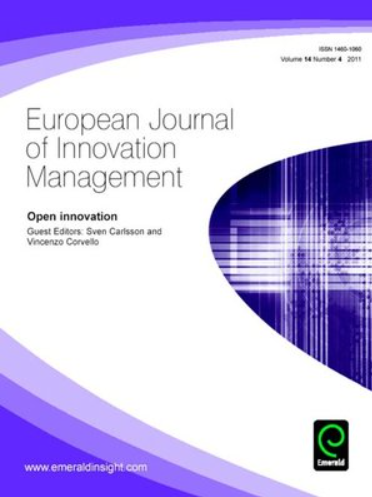Exploring the relationship between entrepreneurial ecosystem inputs and outcomes: the role of digital technology adoption
IF 5.7
3区 管理学
Q1 BUSINESS
引用次数: 0
Abstract
Purpose This work aims to explore the relationship between entrepreneurial ecosystems' (EEs) inputs and outcomes within a digital-technology-driven EE. Specifically, it focuses on how being part of an EE enhances digital technology adoption (DTA) and consequently facilitates EE outcomes. Design/methodology/approach This paper employs a single-case study approach, focusing on Italian EE. The data analysis is based on the researchers' direct observations and semi-structured interviews with the EE founders' teams and the top management of the small- and medium-sized enterprises (SMEs) operating therein. Given the novelty of the topic and the lack of a clear research framework of analysis, a qualitative method is well suited for studying digital-technology-driven EE, thus gaining rich data about the phenomenon in a real-life context. Findings The findings of the study reveal that when specific eco-inputs (financial, knowledge, social and institutional assets) are correctly exploited to enhance DTA, important outcomes, namely, SME competitiveness and new technology-based venture creation and development, are generated. Originality/value The paper contributes to a relatively unexplored topic in the existing literature on EEs and digital technology. Specifically, through the proposition of a conceptual model, it sheds light on the relationship among EE inputs, DTA and EE outcomes.探索创业生态系统投入与产出之间的关系:数字技术采用的作用
本研究旨在探讨数字技术驱动的创业生态系统(EEs)投入与产出之间的关系。具体来说,它侧重于作为EE的一部分如何提高数字技术采用(DTA),从而促进EE的成果。设计/方法/方法本文采用单案例研究方法,重点研究意大利电子商务。数据分析基于研究人员的直接观察和对EE创始人团队以及在其中运营的中小企业(sme)的高层管理人员的半结构化访谈。鉴于该主题的新颖性和缺乏明确的研究分析框架,定性方法非常适合研究数字技术驱动的情感表达,从而在现实环境中获得有关这一现象的丰富数据。研究结果表明,当正确利用特定的生态投入(金融、知识、社会和制度资产)来增强DTA时,会产生重要的结果,即中小企业竞争力和基于新技术的创业和发展。原创性/价值在现有的关于电子商务和数字技术的文献中,这是一个相对未被探索的话题。具体来说,通过提出一个概念模型,它揭示了情感表达输入、DTA和情感表达结果之间的关系。
本文章由计算机程序翻译,如有差异,请以英文原文为准。
求助全文
约1分钟内获得全文
求助全文
来源期刊
CiteScore
10.40
自引率
17.60%
发文量
107
期刊介绍:
The subject of innovation is receiving increased interest both from companies because of their increased awareness of the impact of innovation in determining market success and also from the research community. Academics are increasingly beginning to place innovation as a priority area in their research agenda. This impetus has been partly fuelled by the Economic & Social Research Council (ESRC) who have designated innovation as one of nine research areas in their research initiative schemes.

 求助内容:
求助内容: 应助结果提醒方式:
应助结果提醒方式:


